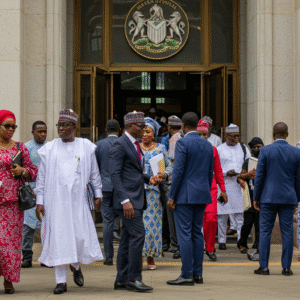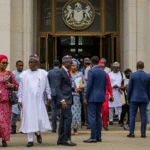7. Lagos State Contributes More Than 25% of Nigeria’s GDP
The economic story of Nigeria is largely the story of Lagos. The state, with a GDP estimated at over $250 billion in 2025, is the unrivaled economic heart of the nation. While it occupies less than 0.4% of Nigeria’s landmass, it contributes more than a quarter of the country’s total GDP and a staggering 50% of its non-oil GDP. Lagos is home to the country’s major ports, stock exchange, and the headquarters of nearly every major bank and corporation. This massive economic concentration creates a dangerous imbalance. The rest of Nigeria remains largely underdeveloped, with economic activities centered around subsistence farming or a smaller-scale service sector. This “Lagos-centric” growth has led to immense overpopulation, strained infrastructure, and a widening economic disparity between the country’s single urban powerhouse and its vast, underutilized rural areas. This highlights a critical need for policies that promote decentralized economic growth and investment in other regions to ensure a more stable and equitable national economy.
8. Nigeria Spends Billions Importing Fuel Despite Owning Oil
This is perhaps the most shocking and infuriating paradox of the Nigerian economy. Despite being one of the world’s leading crude oil producers, Nigeria imports over 70% of the refined petroleum products it consumes. This is a direct result of decades of neglect and mismanagement of its state-owned refineries. They either operate at a fraction of their capacity or are completely non-functional. The consequence is a monumental waste of foreign exchange on fuel importation, which puts immense pressure on the Naira’s value and forces the government to spend billions on fuel subsidies, even after partial removal. This policy is a drain on the national treasury, and the cost is ultimately passed on to the public in the form of higher fuel prices and a weakened currency. The nation is essentially paying to sell its oil cheap and buy it back expensive, a cycle that benefits foreign refiners while hurting the Nigerian people.
9. Over 90% of Government Revenue Goes Into Debt Servicing
Nigeria’s debt problem is a full-blown crisis. As of early 2025, debt servicing costs had become so high they consumed over 90% of the federal government’s revenue in some months, and even soared to 144% in January 2025. This means that for every naira the government earns, nearly all of it goes toward paying off interest and principal on its massive debt. This leaves a minuscule amount—or even a deficit—for essential services like healthcare, education, and infrastructure projects. It’s a classic debt trap: the government borrows more to pay off existing debt, which increases the debt burden, and the cycle continues. This leaves little room for capital expenditure, hindering economic development and perpetuating the cycle of poverty. Without a significant increase in revenue or a restructuring of its debt, Nigeria’s fiscal future is in grave danger.
10. Nigerians Abroad Send More Money Home Than the Government Earns from Oil
In a truly remarkable twist, the single most important source of foreign exchange for Nigeria isn’t its abundant oil reserves—it’s its people. Remittances from the Nigerian diaspora consistently surpass the revenue generated from crude oil exports. Nigerians living abroad send billions of dollars home every year, a lifeline that supports families, funds businesses, and keeps the economy afloat. These funds are used for everything from paying school fees and buying food to building houses and starting small businesses. This fact underscores a powerful truth: Nigeria’s greatest asset is its human capital. It’s a testament to the resilience, hard work, and loyalty of its citizens, both at home and abroad. While the government struggles with fiscal mismanagement and resource-based economic stagnation, the Nigerian people themselves are building a parallel, more resilient economy from the ground up.
A Crossroads for Nigeria’s Economy
The facts laid out in this article reveal a powerful and uncomfortable truth: Nigeria’s economy is a study in profound contradictions. It is a nation of immense potential—blessed with vast human and natural resources—yet crippled by systemic mismanagement and a dangerous over-reliance on a single commodity. The paradox of a rapidly growing economy alongside surging poverty, and the fact that its citizens abroad contribute more to its coffers than its most valuable resource, shows that the traditional economic model is failing.
These are not just statistics; they are a call to action. By understanding these truths, every Nigerian—from the policymaker in Abuja to the entrepreneur in Onitsha—can begin to demand accountability, champion diversification, and push for the radical transparency needed to build a new, more inclusive economic future. The path forward is clear: move beyond the reliance on oil, invest in people, and create a system where wealth is not just concentrated in a single state or in the hands of a few, but is a tangible reality for all citizens.
This video from CNBC Africa provides a more in-depth discussion on Nigeria’s debt service obligations and the implications of it for the economy.






